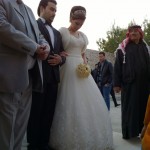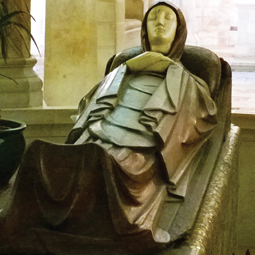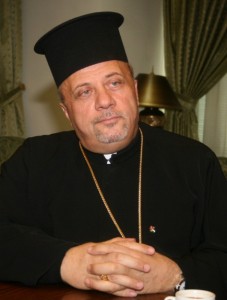
Image: Jordan Tourism Board
During our farewell dinner in Jordan, I had the great privilege to sit next to Fr. Nabil Haddad, founder of the Jordanian Interfaith Coexistence Research Center. The JICRC was established in 2003 with the aim of using research, dialog, and practical initiatives to promote interfaith coexistence – not just in Jordan, but also worldwide. Headquartered in Amman, Jordan, the JICRC acts as a mediator in the divisions between religions that are perpetuated by fear and misunderstanding and that often leads to violence.
A massive undertaking? Definitely.
Impossible? No.
Not with the grace of God and the unshakable dedication of the center’s staff, including, of course, Fr. Nabil himself.
This was the second time I had the gift of interacting with Fr. Nabil while my colleagues and I traveled Jordan as guests of the Jordan Tourism Board April 9-19. The first time was during the Easter Vigil at the at the (Melkite) Cathedral of Sts. Peter and Paul in Amman. The cathedral is Fr. Nabil’s home parish and also the home of the JICRC’s headquarters. (My friend and colleague, Deacon Greg Kandra, also wrote a lovely post about our amazing vigil experience.)
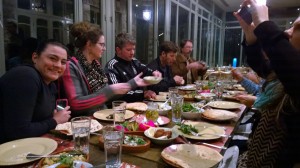
I have to admit that, for as much as I was looking forward to seeing my family again, I was oh-so sad to be leaving Jordan and my “family” of newly-made friends. That included our guide Raed, Haddad (read David Rupert’s perfect description of this awesome man), our JTB host, Christine Moore (the Tour Whisperer, as Deacon Greg fondly named her), our fantastic and easy-to-love cinematographer, Conner Eberhart (I’ll be posting some of his terrific videos of our journey soon), and of course, my colleagues, Deacon Greg, Frank Weathers, Diana vonGlahn, Denise Bossert, Max Lindenman, Mark Pattison, Anna Carroll, Ben Corey, Diana Lepsch, and David Rupert.
As we savored our last meal together as a group, I started thinking about life back home, and what I would do with the unbelievable gifts I’d received during our time in Jordan. I’m utterly convinced that each one of us was hand-picked by God for this trip, and chosen with a special mission in mind.
What was mine?
I still don’t know for sure, but I think I’m getting there, in terms of figuring it out. One thing I do know is that, wherever God leads me, the core of my mission has been to move hearts.
What hearts am I supposed to move? Where am I supposed to move them to?
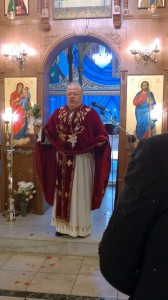
I explained this to Fr. Nabil and asked him, “Father, what should I say to the people back home? What is the message I’m supposed to bear? What can we do to help the persecuted Christians in the world?”
He told me that there’s much that we can do.
First, he said, we must pray. Really PRAY for peace and for those persecuted for the Faith. We need to pray with strength and sincerity. We need to pray, not just here and there, but all the time.
Second, we must realize that not everyone who says “Allah” is a radical Islamist. In fact, not everyone who says “Allah” is even Muslim.
“For example,” Fr. Nabil said, “Take the Coptics (members of the Coptic Orthodox Church). They are very much Christian and yet refer to God as Allah. We cannot be so quick to judge.”
By this Fr. Nabil meant that we must not let fear govern our perceptions of other religions and peoples. The horrors inflicted by ISIS in recent years have conditioned us to fear, perhaps hate, and be suspicious of anyone who uses “Allah” to refer to God. This must stop.
Third, we must live in peace ourselves. We must “live peace in all that we do – in our hearts, homes, jobs, communities, and beyond.
“Tell [the people back home] that they must live peace in all that they do,” Fr. Nabil said.
I still can hear Fr. Nabil’s words. They echo in my ears, my mind, but especially in my heart.
Live peace in all that we do.
The violence and persecutions in the Middle East are closer to us that you may think. Those suffering and dying are our brothers and sisters in Christ. We are bound to them because we all are children of God and in that way, members of the same family. The persecuted Christians aren’t “they.” The persecuted Christians are “we.” They’re not strangers on the other side of the world; they’re part of us, and we must reach out to them.
I experienced that in a very real way as I observed how the Jordanian people practice what they preach. They live in peace among peoples and religions, making sure the hatred and conflict stops at their country’s borders. I saw peace and I felt peace while I was there.
The example of the Jordanian people and the message of Fr. Nabil should echo in our hearts, becoming a credo by which we should live:
Live peace in all that we do.


